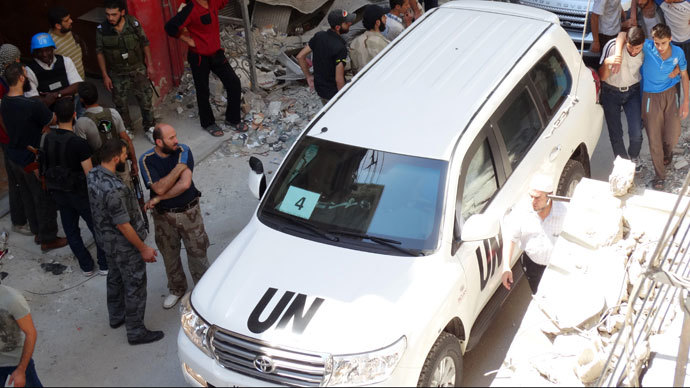UN chemical weapons experts to return to Syria Wednesday - Moscow

UN chemical weapons inspectors are to return to Syria on Wednesday to continue their mission, says Russia. But Moscow is unhappy with the direction the US is steering the Russian-brokered plan to dismantle the Syrian stockpile of chemical weapons.
The experts were sent to investigate several cases of alleged use of chemical weapons, but their work was disrupted by the August 21 attack, which killed an estimated 1,400 people. The team was redirected to the location of the new incident to conduct a probe and produce an intermediate report on it. However, they were expected to continue their initial mission later.
“We are satisfied that our persistent calls for the return of the UN inspectors for an investigation of the previous episodes have finally borne fruit,” Deputy Foreign Minister Sergey Ryabkov told the Russian parliament.
Russia criticized the intermediate report presented at the UN last week, which some Western countries took as blaming the government of Syrian President Bashar Assad for the attack. Moscow says the evidence is not conclusive and argued that a more comprehensive assessment of the situation would prove that Syrian rebels could have been involved in both this and previous attacks.
“US officials compromised on chemical weapons, but they continue talking about how ‘the Syrian regime’, as they call it, is guilty of the use of chemical weapons without providing comprehensive proof. They constantly voice reservations that the plan to punish Damascus up to a military intervention is still in power,” he said.
Washington and its allies are pushing at the UN Security Council for a resolution which would support enforcement of the Syrian disarmament agreement under Chapter 7 of the UN Charter. The chapter allows use of military force to put a UNSC decision into power.

Russia opposes any wording of the resolution which would open the door for automatic punitive measures against Damascus. It also expects the Security Council to wait for the Organization for the Prohibition of Chemical Weapons (OPCW) to prepare a roadmap for destroying the chemical weapons stockpile in Syria.
“Chapter 7 may only be mentioned as an element of a set of measures to be taken against violators in case the implementation of the OPCW decision would be hampered by refusal to cooperate, failure to fulfill one’s obligations or if anyone, whoever it may be, uses chemical weapons,” the deputy FM explained.
Earlier Assad said in an interview that rebel forces may attack international inspectors monitoring
Syrian chemical disarmament on the ground. He explained that such
an attack could be blamed on Damascus and presented as an attempt
his government to derail the process.
Moscow said it was certain that the Assad government will make good its pledge to get rid of its chemical weapons. It therefore fails to understand why the US wants the Security Council to pass a resolution offering Syria a direct threat, Ryabkov said.
“We won’t make the same mistake again; we learned our lesson in Libya very well,” he said in a reference to the UNSC resolution, which allowed countries to take all means necessary to implement a no-fly zone over the north African country in 2011.
The move was expected to prevent the forces of Muammar Gaddafi from bombing cities held by Libyan rebels, but in practice resulted in a NATO bombing campaign, which crippled Libya’s military and allowed rebel forces to take power. The Libyan strongman himself was brutally killed by the rebels rather than tried in a court of law for whatever crimes he was accused of.












